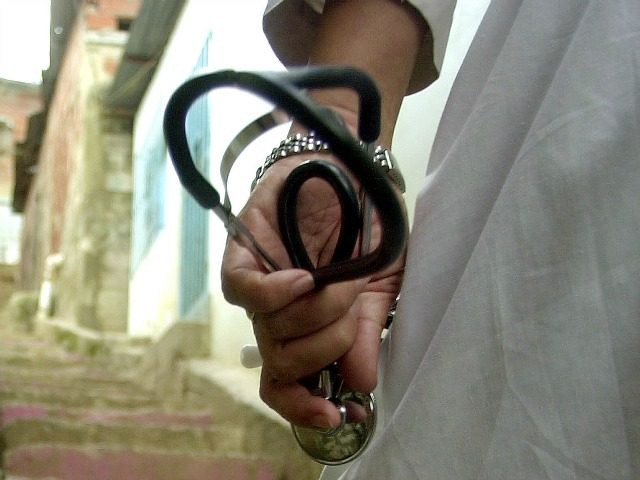Brazil’s Health Minister told reporters last week that his nation’s judiciary has seen “around 150” lawsuits by Cuban doctors forced to work for negligible salaries in Brazil, the pawns in an elaborate for-profit enterprise that nets the communist Castro regime millions of dollars a year.
The issue caught the attention of the New York Times, a publication that has attacked the United States for offering refuge to Cuban doctors who manage to escape the system and reach America, dismissing the doctors’ complaints as unsubstantiated.
Brazilian Health Minister Ricardo Barros spoke in Washington, D.C., on Tuesday according to the national newspaper O Globo, and said Cuba has expressed concern that the program that brings these doctors into Brazil may soon result in a flood of litigation. “Mais Medicos” (“More Doctors”), a program established by ousted leftist president Dilma Rousseff, aims to fill gaps in the Brazilian health care system by forcing Cuban doctors into the nation’s most remote and impoverished areas.
“There are around 150 [legal] actions in which Cuban doctors are asking to remain in Brazil because, after the three-year cycle, they must return and be replaced by other professionals,” Barros explained. “They also ask to receive directly the salary paid by the government.”
Currently, Brazil pays Havana directly for the doctors it provides, leaving the Castro regime responsible for providing the doctors with a “stipend” for food, shelter, and other needs. Many doctors are forced to travel without their families and little guarantees that their salary will be enough for food.
Barrios stated that Brazil was largely successful in preventing doctors seeking to stay in Brazil legally from doing so, saying, “Brazil has been successful in overturning any injunctions obtained by these professionals to remain in Brazil outside the conditions of the agreement.”
O Globo adds that the current administration of centrist Michel Temer is seeking to continue the Mais Medicos program, but fill more spots with native Brazilian doctors, rather that relying on Cuba to continue providing care. The current agreement with the Castro regime is scheduled to end in 2019.
Cuban doctors in Brazil speaking to the New York Times say they began convening in a Whatsapp group and eventually found an attorney sympathetic to their dire state of affairs. André de Santana Corrêa, an attorney that took on some Cuban doctor cases, told the outlet that the demand for legal representation from Cuban doctors surprised.
“There comes a time when you get tired of being a slave,” Yaili Jiménez Gutierrez, a doctor, told the Times. At least one Brazilian federal judge, who denounced the program as a “form of slave labor,” agreed.
Barros is working to prevent more such cases from succeeding, according to the Times, which quotes him as saying, “there is no injustice.”
The Times itself—which has a long history of supporting Fidel Castro’s violent revolution—has agreed.
“There is much to criticize about Washington’s failed policies toward Cuba and the embargo it has imposed on the island for decades,” the Times Editorial Board wrote in 2014. “But the Cuban Medical Professional Parole Program, which in the last fiscal year enabled 1,278 Cubans to defect while on overseas assignments, a record number, is particularly hard to justify.”
“American immigration policy should give priority to the world’s neediest refugees and persecuted people. It should not be used to exacerbate the brain drain of an adversarial nation at a time when improved relations between the two countries are a worthwhile, realistic goal,” the article continued, before praising the alleged “$1,200 per month” salary Cuban doctors received in Brazil as lavish.
Granma, Cuba’s state propaganda newspaper, highlighted the Times editorial.
Cuba lures doctors to work abroad by keeping their wages at home repressed and offering significantly more abroad. In 2014, Cuba raised the official communist government salary for doctors to $64 a month, up from $25 a month. A doctor quoted in last week’s Times article says she was told she could make $1,400 in Brazil but was forced to leave her children at home. Brazil pays Cuba nearly four times that amount per doctor; the Castro regime pockets the rest. In some cases—like the mass deployment of doctors to fight the 2014 Ebola outbreak in west Africa—Havana has refused to pay the doctors.
In 2014, reports estimated that Cuba generates nearly $8 million a year on their doctor trade. Most recently, Havana deployed 40 doctors to Oaxaca, Mexico, to assist in aiding those injured in September’s mass earthquake there.

COMMENTS
Please let us know if you're having issues with commenting.